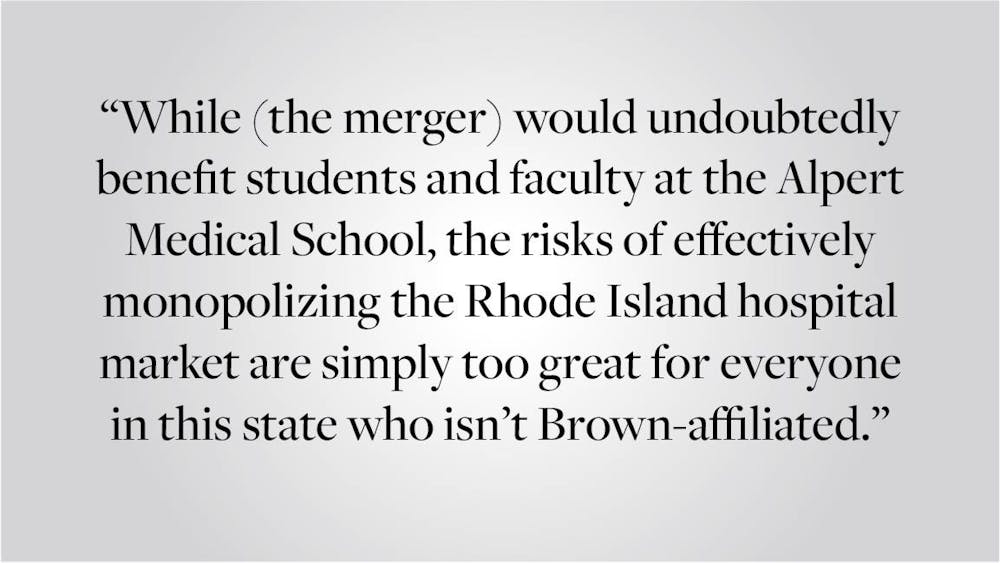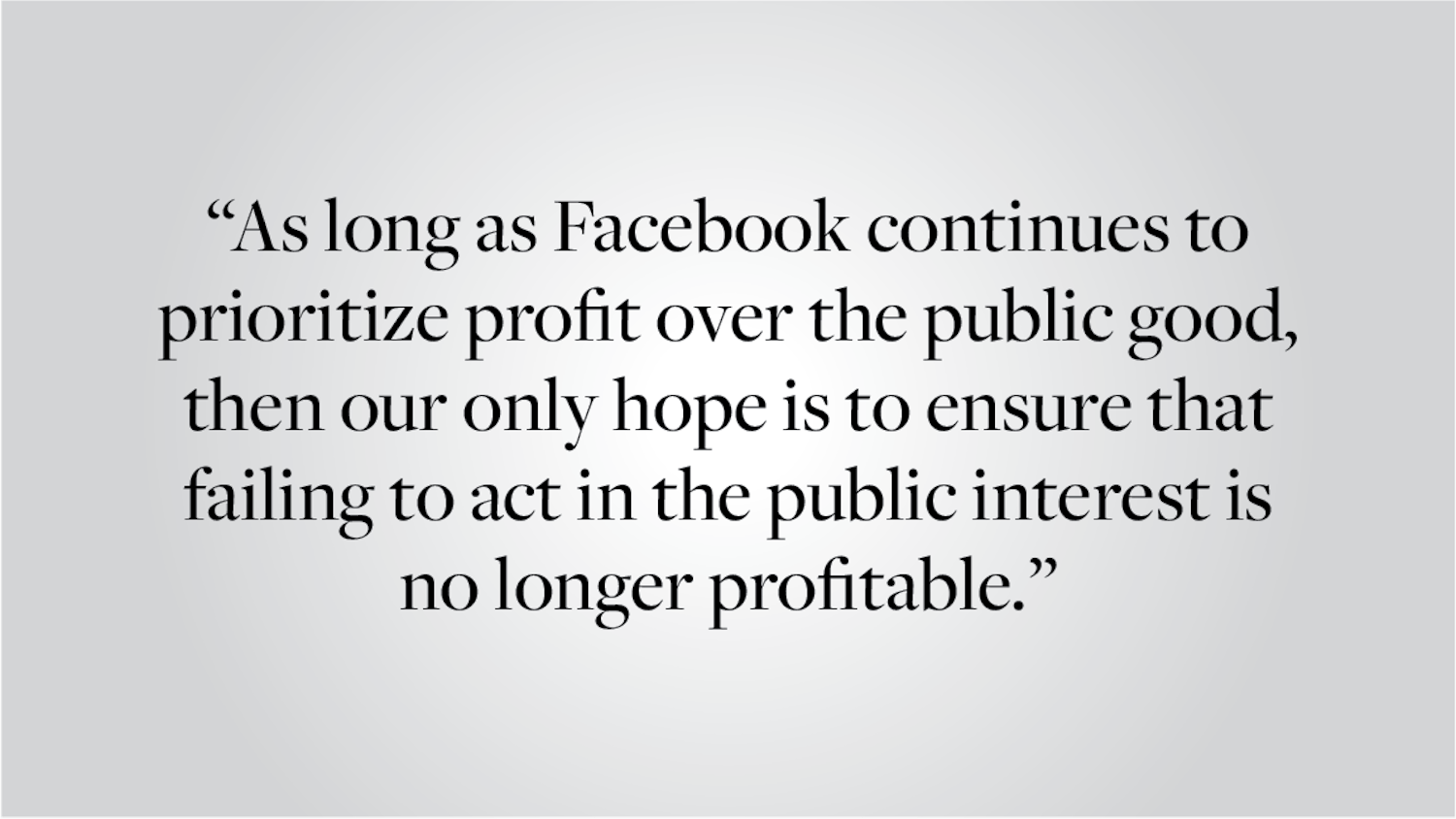The University is planning to sink at least $125 million over five years into a hospital mega-merger that, if approved, would effectively monopolize inpatient care in Rhode Island. It’s a huge deal that could have serious consequences for the cost and quality of health care in the state. So why isn’t the Brown community talking about it?
Many of us probably didn’t (or still don’t) know that the merger is happening or that the University is involved. Granted, hospital mergers aren’t exactly a riveting lunchtime topic. But I’d wager that our community’s collective unawareness about this deal stems primarily from the University’s decision not to initiate a community dialogue about the proposed merger of Lifespan and Care New England. With the exception of two heavily polished press releases published months ago, President Christina Paxson P’19 and Senior Vice President for Health Affairs Jack Elias have largely declined to include students, faculty, staff and alums in discussions about the potential union of the state’s largest hospital systems.
That reluctance is in part because the evidence isn’t on the University’s side. In general, hospital mergers increase prices and have a negligible or even negative effect on care quality. While Paxson has made unsubstantiated claims to the contrary in the media, a wealth of research has shown that prices tend to go up and quality tends to decline as hospitals consolidate.
Researchers generally attribute post-consolidation price hikes to hospitals’ increased market power and their willingness to use it to extract ever-higher reimbursements from commercial health insurers. This is because when one hospital system dominates in a given market, insurance companies lose bargaining power in negotiations with hospitals over the cost of services. The results are higher monthly premiums and handsome revenues for merged hospital systems. The care quality issue is a bit more complicated, but a seminal study published in the New England Journal of Medicine concluded that hospital mergers were “associated with modestly worse patient experiences and no significant changes in readmission or mortality rates.”
Unable to argue that the merger won’t raise costs or hurt quality, the merging parties have resorted to claiming that this deal will keep care local. But we can both block this harmful merger and prevent the outsourcing of care. The Rhode Island Attorney General and Department of Health can veto hospital mergers under state law. If this merger falls through, and companies from New Haven or Boston want to acquire Rhode Island hospitals, in turn sending patients out of state for complicated procedures, our elected representatives and executive branch officials can easily send them packing.
The University appears content to sponsor this merger regardless of its likely adverse effects on Rhode Islanders’ commercial health insurance premiums. This tunnel vision likely comes in part from the University’s desire to train its medical students in an integrated academic health system as a means of competing with Harvard and Yale, which already do so. The transaction could also help University researchers secure prestigious federal grants to study cancer and neuroscience. While these upsides would undoubtedly benefit students and faculty at the Alpert Medical School, the risks of effectively monopolizing the Rhode Island hospital market are simply too great for everyone in this state that isn’t Brown-affiliated.
Fortunately, the Federal Trade Commission may well block this merger under federal antitrust law. Many of President Biden’s actions with regard to the FTC, such as the nomination of antitrust advocate Lina Khan as its chair and the recent executive order on competition, suggest that the administration might torpedo the deal. But even if the FTC successfully blocks the transaction on antitrust grounds, it could still happen.
That’s because the University, Lifespan and Care New England will almost certainly lobby the Rhode Island legislature to insulate their merger from federal antitrust enforcement if the FTC deems it anti-competitive and convinces a court to strike it down. The Supreme Court has held that state legislatures can do just that under a legal doctrine known as state-action immunity. Under state-action immunity, state legislatures can allow anti-competitive mergers to proceed while imposing regulations on the consolidated hospital system. Though the Commission has yet to take action against the merger, the CEOs of Lifespan and Care New England already began discussing the idea of overriding the FTC with R.I. House Speaker Joe Shekarchi and State Senate President Dominick Ruggerio months ago.
My own research has found that invoking state-action immunity would be a terrible idea. In an article published on the Health Affairs blog in August, Professor of the Practice of Health Services, Policy and Practice Chris Koller and I reviewed the evidence concerning the use of state-action immunity for hospital mergers against the backdrop of the proposed Rhode Island merger. We found that legislatures almost always roll back state-action immunity policies in the long run, leaving deregulated hospital monopolies or near-monopolies in their wake. These hospital systems can then leverage their enormous market power to charge outrageous prices and get away with skimping on quality.
As its relative silence makes clear, the Brown administration doesn’t want us to discuss this deal or its implications. They’re understandably fearful of community activism against the merger, since the University pulling out of this deal could scrap it entirely. Indeed, Brown’s lack of support for a previous merger arguably led to its downfall.
If Brown’s involvement in this merger is holding the deal together, as I believe it is, then it’s up to us to do what’s right. We owe it to our fellow Rhode Islanders to use our voices and our power to pull the plug on this merger. It’s bad for patients, it’s bad for prices and Rhode Island deserves better.
Liam Bendicksen ’22 can be reached at liam_bendicksen@brown.edu. Please send responses to this opinion to letters@browndailyherald.com and other op-eds to opinions@browndailyherald.com.





